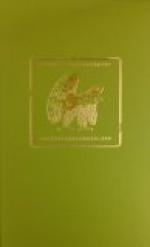“That has been my one rare good-fortune; to have had Elizabeth. Not that I depreciate my other friends,” and she gave Foster another fleeting smile. “There was Mrs. Brown who in the autumn, when I saw the necessity to give up my apartment at Vivian Court, asked me to stay in exchange for piano and dancing lessons. I had often taught her little girls for pleasure, they were so sweet and lovable, when they visited in my rooms. Still, afterwards, I learned the suggestion came from Elizabeth. Now you know everything,” she added with determined gaiety. “And I have had my draught of ozone. We must hurry back, or they will wonder what has become of us.”
She turned to the path, and the young engineer followed in silence. He did not know everything; deep in his heart the contradiction burned. Whatever may have caused her exhilaration at the time the Aquila arrived, it was not his return, and while her explanations satisfied him that she was in no immediate financial distress, he felt that her confidence covered unplumbed depths she did not wish him to sound.
They had reached the footbridge over the cascade when he said abruptly: “After all, I am glad Lucky Banks got ahead on the irrigation project. He will find it feasible, if any one can. He grew up on an Oregon farm, and what he hasn’t learned about sluicing in Alaska isn’t worth knowing. It leaves Hollis Tisdale no alternative.”
She turned waiting, with inquiry in her eyes.
“I mean in regard to the Aurora. He hasn’t the saving grace of an excuse, now, not to convey that last half interest back to you.”
“I do not want a half interest in the Aurora mine.” She drew herself very straight, swaying a little on the balls of her feet. “You must not suggest it. I should not accept it even through a United States court. It belongs to Mr. Tisdale. He furnished the funds that made my husband’s prospecting trip possible. And all the gold in Alaska could not repay him for—what he did. Sometimes, when I think of him alone on that terrible trail, he stands out more than a man. Epics have been written on less; it was a friendship to be glorified in some great painting or bronze. But then he touched so lightly on his own part in the story; in the incense he burned to David he was obscured.”
Foster stood watching her in surprise. The color that the wind had failed to whip back to her cheeks burned now, two brilliant spots; raindrops, or tears, hung trembling on her lashes, and through them flamed the blue fires of her eyes.
“So,” he said slowly, “so, Tisdale did hunt you up, after all; and, of course, you had the whole hard story from him.”
“I heard him tell it, yes, but he left out about the—wolves.”
“Wolves?” repeated Foster incredulously. “There were no wolves. Why, to be overtaken by a pack, single-handed, on the trail, is the worst that can happen to a man.”
She nodded. “Mr. Banks told me. He had talked with the miners who found him. It was terrible.” A great shudder ran through her body; for a moment she pressed her fingers to her eyes, then she added with difficulty, almost in a whisper: “He was defending David.”




